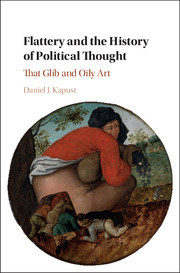Description
Flattery and the History of Political Thought
That Glib and Oily Art
Author: Kapust Daniel J.
Demonstrates flattery's importance for political theory, addressing representation, republicanism, and rhetoric through classical, early modern, and eighteenth-century thought.
Language: English
Subject for Flattery and the History of Political Thought:
Approximative price 107.80 €
In Print (Delivery period: 14 days).
Add to cart
Publication date: 01-2018
238 p. · 15.6x23.5 cm · Hardback
238 p. · 15.6x23.5 cm · Hardback
Description
/li>Contents
/li>Biography
/li>
Flattery is an often overlooked political phenomenon, even though it has interested thinkers from classical Athens to eighteenth-century America. Drawing a distinction between moralistic and strategic flattery, this book offers new interpretations of a range of texts from the history of political thought. Discussing Cicero, Pliny, Castiglione, Machiavelli, Hobbes, Mandeville, Smith, and the Federalist/Anti-Federalist debates, the book engages and enriches contemporary political theory debates about rhetoric, republicanism, and democratic theory, among other topics. Flattery and the History of Political Thought shows both the historical importance and continued relevance of flattery for political theory. Additionally, the study is interdisciplinary in both subject and approach, engaging classics, literature, rhetoric, and history scholarship; it aims to bring a range of disciplines into conversation with each other as it explores a neglected - and yet important - topic.
Introduction; 1. 'Suffer no man to be king': friendship, liberty, and status in Roman political thought; 2. Without 'superfluous ornament': Castiglione, Machiavelli, and the performance of counsel; 3. 'The Monarch's plague': the problem of flattery and Hobbes's contingently unitary sovereign; 4. 'The bewitching engine': Mandeville and Smith on flattery, praise, and the origins of language; 5. 'Flattering to young ambitious minds': representing America in the ratification; Conclusion.
Daniel J. Kapust is Professor of Political Science at the University of Wisconsin-Madison. Affiliated with the Departments of Classical and Ancient Near Eastern Studies, Comparative Literature and Folklore Studies, and the Centers for Early Modern Studies and European Studies, he has published in the American Political Science Review, the Journal of Politics, European Journal of Political Theory, Political Theory, History of Political Thought, the Journal of the History of Ideas, and Political Studies. His first book, Republicanism, Rhetoric, and Roman Political Thought: Sallust, Livy, and Tacitus (Cambridge), was published in 2011, and he co-edited Comparative Political Theory in Time and Place (2016).
© 2024 LAVOISIER S.A.S.




